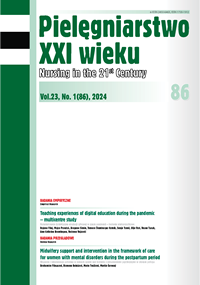Medication administration errors in the selected Czech hospitals: an observational study
DOI:
https://doi.org/10.2478/pielxxiw-2024-0009Keywords:
hospitals, prescriptions, medication administration errors, nursingAbstract
MEDICATION ADMINISTRATION ERRORS IN THE SELECTED CZECH HOSPITALS: AN OBSERVATIONAL STUDY
Aim. The study aimed to identify the occurrence of medication administration errors in clinical practice.
Material and methods. This was a direct observational study. The study included observing the medication administration process over three years in four hospitals in the Czech Republic. STROBE was used as a checklist.
Results. A total of 18,370 medication administrations to hospitalized patients were observed and recorded, including morning, noon, and evening administrations. The most common MAE was substituting a prescribed medication without the doctor’s consent, especially among nurses aged 35-44 (p < 0.001). These MAEs involved giving a medication of diff erent strength than prescribed (p < 0.001), giving the wrong medication (p < 0.001), and giving a diff erent dose (p < 0.001). Substitutions of MAEs occurred most often during morning medication administration (p < 0.001).
Conclusions. A critical fi nding of this study was the substitution of medications without a doctor’s consent. It has been found that MAEs were not uncommon in clinical practice, and factors such as the nurse’s age, overall length of clinical practice, education, and workplace interruptions played a role.
References
1. WHO. 2023. Medication Without Harm – Global Patient Safety Challenge on Medication Safety. Geneva: World Health Organization; 2017.
2. WHO. Medication without harm. World Health Organization. 2017.
3. Eltaybani S, Mohamed N, Abdelwareth M. Nature of nursing errors and their contributing factors in intensive care units. Nurs. Crit. Care. 2019; 24(1): 47-54.
4. al Tehewy M, Fahim H, Gad NI, et al. Medication Administration Errors in a University Hospital. J. Patient Saf. 2016; 12(1): 34-39.
5. Billstein-Leber M, Carrillo CJD, Cassano AT, et al. ASHP Guidelines on Preventing Medication Errors in Hospitals. Am. J. Health Syst. Pharm. 2018; 75(19): 1493-1517.
6. Tariq RA, Vashisht R, Sinha A, et al. Medication Dispensing Errors and Prevention. In: StatPearls. Treasure Island (FL): StatPearls Publishing.
7. Hammoudi BM, Ismaile S, Abu Yahya O. Factors associated with medication administration errors and why nurses fail to report them. Scand. J. Caring Sci. 2018; 32(3): 1038-1046.
8. Brabcová I, et al. Use of FMEA analysis in nursing care risk management. Oncology. 2021; 15: 197-203.
9. Zyoud SH, Khaled SM, Kawasmi BM, et al. Knowledge about the administration and regulation of high alert medications among nurses in Palestine: a cross-sectional study. BMC Nurs. 2019; 18: 11.
10. Heczková J, Bulava A. Nurses’ knowledge of the medication management at intensive care units. Pielęgniarstwo XXI wieku. 2018; 17(1): 18-23.
11. Park J, Han AY. Medication safety education in nursing research: Text network analysis and topic modeling. Nurse Educ. Today. 2023; 121: 105674.
12. Zavada J, Dixon WG, Askling J. EULAR Study group on Longitudinal Observational Registers and Drug Studies. Launch of a checklist for reporting longitudinal observational drug studies in rheumatology: a EULAR extension of STROBE guidelines based on experience from biologics registries. Ann. Rheum. Dis. 2014; 73(3): 628.
13. World Medical Association. World Medical Association Declaration of Helsinki: ethical principles for medical research involving human subjects. JAMA. 2013; 310(20): 2191-2194.
14. Assunção-Costa L, de Sousa IC, Silva RKR, et al. Observational study on medication administration errors at a University Hospital in Brazil: incidence, nature and associated factors. J. Pharm Policy Pract. 2022; 15(1): 51.
15. Jessurun JG, Hunfeld NGM, van Dijk M, et al. Cost-effectiveness of central automated unit dose dispensing with barcode-assisted medication administration in a hospital setting. Res. Social Adm. Pharm. 2022b; 18(11): 3980-3987.
16. Brabcová I, et al. Reasons for medication administration errors, barriers to reporting them and the number of reported medication administration errors from the perspective of nurses: A cross-sectional survey. Nurse Educ. Pract. 2023; 70: 103642.
17. Mohanna Z, Kusljic S, Jarden R. Investigation of interventions to reduce nurses’ medication errors in adult intensive care units: A systematic review. Aust. Crit. Care. 2022; 35(4): 466-479.
18. Jessurun JG, Hunfeld NGM, de Roo M, et al. Prevalence and determinants of medication administration errors in clinical wards: A two-centre prospective observational study. J. Clin. Nurs. 2023; 32(1-2): 208-220.
19. Luokkamäki S, Härkänen M, Saano S, et al. Registered Nurses’ Experiences of Using a 3D Game in the Development of clinical Competency: A qualitative Study. J. Med. Edu. 2023; 22: e129060.
20. Sessions LC, Nemeth LS, Catchpole K, et al. Nurses’ perceptions of high-alert medication administration safety: A qualitative descriptive study. J. Adv. Nurs. 2019; 75(12): 3654-3667.
21. Bucknall T, Fossum M, Hutchinson AM, et al. Nurses’ decision-making, practices and perceptions of patient involvement in medication administration in an acute hospital setting. J. Adv. Nurs. 2019; 75(6): 1316-1327.
Downloads
Published
Issue
Section
License
Copyright (c) 2024 Authors

This work is licensed under a Creative Commons Attribution 4.0 International License.




